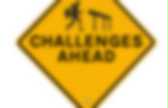

Harvard Professors Call for Greater Oversight of MOOCs - Wired Campus. Several dozen professors in Harvard University’s Faculty of Arts and Sciences have signed a letter to their dean asking for formal oversight of the massive open online courses offered by Harvard through edX, a MOOC provider co-founded by the university.

While “some faculty are tremendously excited about HarvardX,” the professors wrote, referring to the university’s brand within the edX platform, “other are deeply concerned about the program’s cost and consequences.” The letter, published on Thursday in The Harvard Crimson, the student newspaper, was signed by 58 professors in the university division, which is known as the FAS.
The authors go on to ask Michael D. Smith, dean of the FAS, to appoint a committee of arts and sciences faculty members “to draft a set of ethical and educational principles” that would govern their colleagues’ involvement in Harvard-branded MOOCs. MOOC pedagogy: the challenges of developing for Coursera. In the summer of 2012 the team of teachers and researchers associated with the MSc in E-learning programme at the University of Edinburgh began developing a Massive Open Online Course (MOOC) for the Coursera platform.
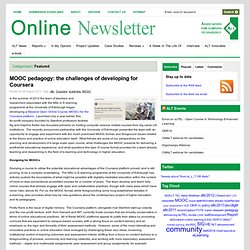
Launched only a year earlier, this for-profit company founded by Stanford professors Andrew Ng and Daphne Koller has focussed primarily on hosting computer science related courses from big name US institutions. The recently announced partnership with the University of Edinburgh presented the team with an opportunity to engage and experiment with the much-publicised MOOC format, and foreground issues related to the theory and practice of online education itself. Designing for MOOCs. The Trouble With Online College. First, student attrition rates — around 90 percent for some huge online courses — appear to be a problem even in small-scale online courses when compared with traditional face-to-face classes.

Second, courses delivered solely online may be fine for highly skilled, highly motivated people, but they are inappropriate for struggling students who make up a significant portion of college enrollment and who need close contact with instructors to succeed. Online classes are already common in colleges, and, on the whole, the record is not encouraging. According to Columbia University’s Community College Research Center, for example, about seven million students — about a third of all those enrolled in college — are enrolled in what the center describes as traditional online courses.
The MOOC Honeymoon is Over: Three Takeaways from the Coursera Calamity. The honeymoon with MOOCs is over.
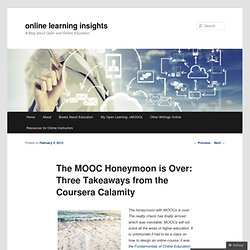
The reality check has finally arrived which was inevitable. MOOCs will not solve all the woes of higher education. It is unfortunate it had to be a class on how to design an online course; it was the Fundamentals of Online Education: Planning and Application [FOE] offered through Coursera that brought things to a screeching halt. But this experience can provide an opportunity for institutions to re-focus—identify the role and purpose of MOOCs and move forward with a thoughtful, purposeful strategy. MOOC Interrupted: Top 10 Reasons Our Readers Didn’t Finish a Massive Open Online Course. One MOOC professor won't let students know the right answers. Some students taking free classes from Coursera may never know the right answers.
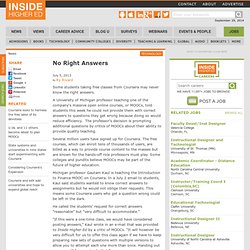
A University of Michigan professor teaching one of the company's massive open online courses, or MOOCs, told students this week he could not provide them with correct answers to questions they get wrong because doing so would reduce efficiency. The professor’s decision is prompting additional questions by critics of MOOCs about their ability to provide quality teaching. Several million users have signed up for Coursera. MOOC – Setup for Failure? Unless you have been like Rip Van Winkle for the past few years, you are well aware of the latest rage in online education – MOOC.

Massive Online Open Courses – better known as MOOC – are big – in terms of courses, end users and online learning. 72% Of Professors Who Teach Online Courses Don’t Think Their Students Deserve Credit.
Skepticism About Tenure, MOOCs and the Presidency: A Survey of Provosts. Today's provosts are a skeptical lot.
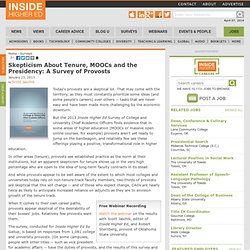
That may come with the territory, as they must constantly prioritize some ideas (and some people's careers) over others -- tasks that are never easy and have been made more challenging by the economic downturn. But the 2013 Inside Higher Ed Survey of College and University Chief Academic Officers finds evidence that in some areas of higher education (MOOCs or massive open online courses, for example) provosts aren't yet ready to jump on the bandwagon, and relatively few see these offerings playing a positive, transformational role in higher education.
Why Isn’t the Digital Humanities Community Building Great MOOCs? In spite of the fact that I’m a mathematician, I’ve been fairly active in the digital humanities (DH) community for a while now.

I’m interested in creative and effective uses of educational technology, and, in the humanities, that means tracking what’s happening among the DH community. Many of the examples of educational technology I include in my talks and workshops come from this community, and here at Vanderbilt I’m an active participant in the DH seminar organized by our humanities center. I offer this to provide some context for the following question: Why isn’t the digital humanities community producing the most amazing MOOCs around? MOOCs are massive, open, online courses. Okay, I admit, these questions are mostly rhetorical. MOOC Interrupted: Top 10 Reasons Our Readers Didn’t Finish a Massive Open Online Course.
The Big Problem for MOOCs Visualized. MOOCs — they’re getting a lot of hype, in part because they promise so much, and in part because you hear about students signing up for these courses in massive numbers. 60,000 signed up for Duke’s Introduction to Astronomy on Coursera. 28,500 registered for Introduction to Solid State Chemistry on edX.
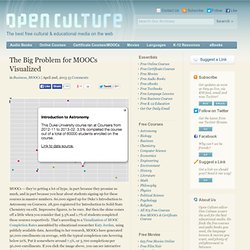
Impressive figures, to be sure. But then the shine comes off a little when you consider that 3.5% and 1.7% of students completed these courses respectively. That’s according to a Visualization of MOOC Completion Rates assembled by educational researcher Katy Jordan, using publicly available data. According to her research, MOOCs have generated 50,000 enrollments on average, with the typical completion rate hovering below 10%. Put it somewhere around 7.5%, or 3,700 completions per 50,000 enrollments. If you’re a venture capitalist, you’re probably a little less wowed by 3,700 students taking a free course.
MITx - the Fallout Rate. Dropout rates are a concern for concrete universities.When a student fails to complete a course they signed up to it's bad - for the student, for the teacher and for the institution.
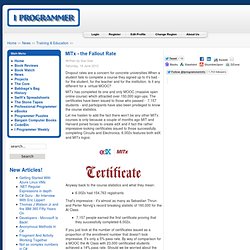
Is it any different for a virtual MOOC? MITx has completed its one and only MOOC (massive open online course) which attracted over 150,000 sign-ups. The certificates have been issued to those who passed - 7,157 students - and participants have also been privileged to know the course statistics. Let me hasten to add the fact there won't be any other MITx courses is only because a couple of months ago MIT and Harvard joined forces to create edX and if fact the rather impressive-looking certificates issued to those successfully completing Circuits and Electronics, 6.002x features both edX and MITx logos: Anyway back to the course statistics and what they mean: 6.002x had 154,763 registrants 7,157 people earned the first certificate proving that they successfully completed 6.002x. How to Ghost College Classes. Steve Jobs says that dropping out of college was one of the best decisions he ever made.
Why? Because after quitting school he was able to sit in on courses that actually helped him learn. Are online classes key to higher ed? - Video on NBCNews.